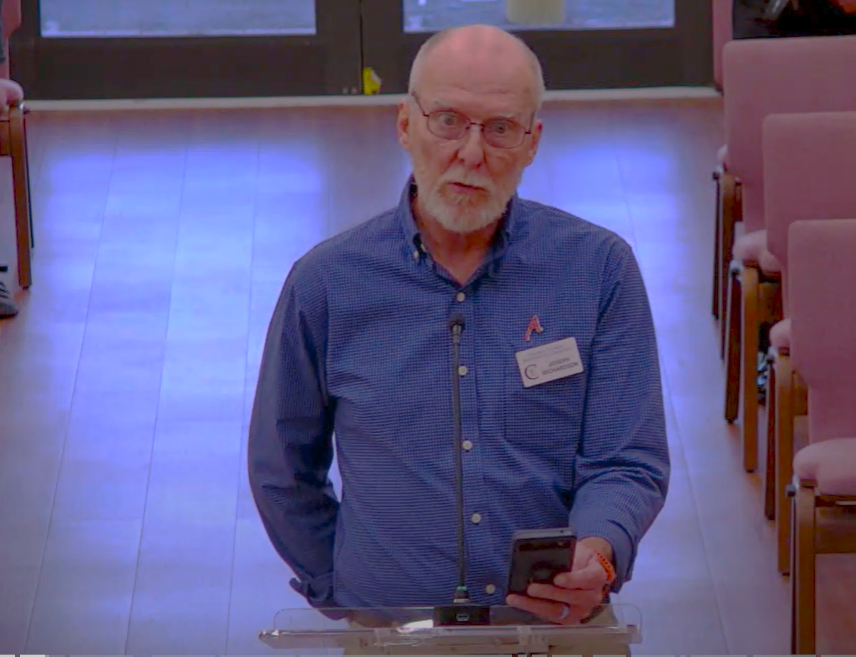'In good faith?' Atheist group calls out Tavares City Council 'corrective' prayer

- Oops!Something went wrong.Please try again later.
Was a second Christian prayer at a Tavares City Council meeting intended in good faith or was it a "Bless his heart" moment?
At the Feb. 7 meeting of the Tavares City Council, Central Florida Freethought Community board member Joseph Richardson appeared by invitation to deliver the opening invocation.
According to an open letter to the council by David Williamson, a CFFC co-founder, "Richardson delivered a respectful secular message of equality and diversity, encouraging members of the public and the City Council to reflect the wisdom of reason and empathy that binds all together.
"He asked that the council be guided by the principles of inclusivity, fairness, and respect for the autonomy of every individual, and celebrated the city’s shared values transcending creed, culture, and conviction." (You can find Richardson's entire invocation at cflfreethought.org/tavares-fl-february-7-2024.)
During Richardson's invocation, Mayor Bob Grenier and City Council member Lori Pfister engaged in a private discussion off-mic, behind the platform. Afterward, Grenier directed city Utilities Director Phil Clark to deliver a prayer.
Clark asked that God “forgive us for our sins. … In Jesus Christ’s name.” Afterward, a visibly stunned Richardson looked on as Clark led the assembly in the Pledge of Allegiance.
Video of the city invocation and prayer at the beginning of the meeting can be found at tavaresfl.portal.civicclerk.com/event/376/media. The Daily Commercial contacted Grenier, but he has not responded to the accusations as of this writing.
The CFFC announced that representatives will return to speak during the next Tavares City Council meeting and "point out the harms done when elected leaders demonstrate a preference for Christians and treat non-religious participants in government meetings unfairly."
Williamson is one of several members of the organizations providing input during the public comment period at the Feb. 21 Tavares City Council meeting.
"What we have seen over the past 10 years that we've been doing this, and then beyond that, is a significant, kind of recoil initially, particularly by smaller towns and, and more intransigent, you know, I guess zealots or religious people who just don't want us there," Williamson told the Daily Commercial.
Members of the CFCC have given non-religious invocations at county and municipal meetings throughout Lake County, including four at Tavares City Council meetings since 2014.
"There have been refusals to let us in," Williamson said. "There have been five times. This (the Feb. 7 meeting) is the fifth time when someone has offered a corrective quote-unquote prayer in Jesus' name. ... This doesn't happen when Christians pray, and that's probably 90 to 95% of the invocations by our counts."
The other four "corrective" second prayers happened in Eustis, Oviedo, Apopka and at the Lake County Commission, Williamson added via follow-up email.
Opening meetings with a Christian prayer is a commonplace practice at North Central Florida government proceedings.
The impetus for atheists and other religion representatives to participate in prayers at meetings goes back to a 2014 Supreme Court case: The Town of Greece vs. Galloway, a judicial boilerplate for allowing Christian prayer — and all other prayer — during town meetings.
The district court entered summary judgment upholding the prayer practice. The case went to the Supreme Court. Justice Anthony Kennedy issued the majority opinion for the five justices. He concluded that the prayers are constitutional, "because they aren’t overly sectarian or overly coercive ..."
Justice Stephen G. Breyer wrote a dissent arguing that "as the Court of Appeals held, the Town of Greece must do more to make its legislative prayer inclusive of other faiths."
Williamson recommended researching an instance when a Hindu prayer was deemed objectionable by some around 15 years in the U.S. Congress.
"When minority religions participate in in government, they don't receive the equal treatment that they deserve," he added.
The city of Tavares, among other communities, publicly observes the National Day of Prayer on the first Thursday of May, created in 1952 by a joint resolution of the United States Congress and was signed into law by President Harry S. Truman. The aim of the day is to encourage personal repentance and righteousness.
“As Mayor Grenier’s conduct at the meeting demonstrated, prayer at government meetings is unnecessary, inappropriate and divisive,” Freedom From Religion Foundation Staff Attorney Chris Line writes. "FFRF asserts that the best solution to the situation is to discontinue invocations altogether. .... This Christian prayer, apparently delivered because the invocation Joseph gave was not sufficiently Christian,was discriminatory and unconstitutional."
This article originally appeared on Daily Commercial: Unfair? Group protests second prayer by Tavares City Council

